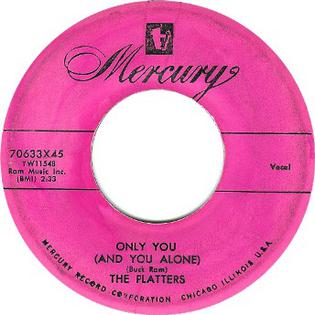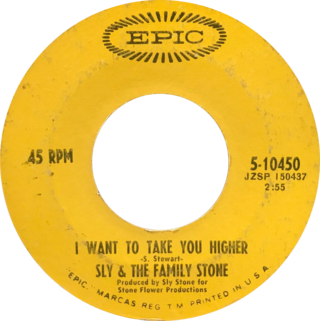Cover version is a later version of a song already established with a different earlier performer.
It may also refer to:
- Cover Version , an album by Steven Wilson
- "Cover (Version)", a song by Belle and Sebastian
Cover version is a later version of a song already established with a different earlier performer.
It may also refer to:

In popular music, a cover version, cover song, remake, revival, or simply cover, is a new performance or recording by a musician other than the original performer or composer of the song. Originally, it referred to a version of a song released around the same time as the original in order to compete with it. Now, it refers to any subsequent version performed after the original.

"We Will Rock You" is a song written by Brian May and recorded by British rock band Queen for their 1977 album News of the World. Rolling Stone ranked it number 330 of "The 500 Greatest Songs of All Time" in 2004, and it placed at number 146 on the Songs of the Century list in 2001. In 2009, "We Will Rock You" was inducted into the Grammy Hall of Fame.

Melanie Anne Safka-Schekeryk, professionally known as Melanie or Melanie Safka, is an American singer-songwriter. She is best known for the 1971–72 global hit "Brand New Key", plus her 1970 version of "Ruby Tuesday", which was originally written and recorded by the Rolling Stones, her composition "What Have They Done to My Song Ma", and her 1970 international breakthrough hit "Lay Down ".

"Only You (And You Alone)" (often shortened to "Only You") is a pop song composed by Buck Ram. It was originally recorded by The Platters with lead vocals by Tony Williams in 1955.

"Have a Cigar" is the third track on Pink Floyd's 1975 album Wish You Were Here. It follows "Welcome to the Machine" and on the original LP opened side two. In some markets, the song was issued as a single. English folk-rock singer Roy Harper provided lead vocals on the song. It is one of only three Pink Floyd recordings with a guest singer on lead vocals, the others being "The Great Gig in the Sky" (1973) with Clare Torry and "Hey Hey Rise Up" (2022) with Andriy Khlyvnyuk. The song, written by Waters, is his critique of the rampant greed and cynicism so prevalent in the management of rock groups of that era.
"The Man Who Sold the World" is a song by English singer-songwriter David Bowie. The title track of Bowie's third studio album, it was released in November 1970 in the US and in April 1971 in the UK by Mercury Records. Produced by Tony Visconti, it was recorded at Trident and Advision Studios in London in May 1970, towards the end of the album's sessions; Bowie recorded his vocal on the final day of mixing for the album, reflecting his generally dismissive attitude during the sessions. Musically, it is based around a "circular" guitar riff from Mick Ronson. Its lyrics are cryptic and evocative, being inspired by numerous poems including the 1899 "Antigonish" by William Hughes Mearns. Bowie's vocals are heavily "phased" throughout and have been described as "haunting".

"I Want to Take You Higher" is a song by the soul/rock/funk band Sly and the Family Stone, the B-side to their Top 30 hit "Stand!". Unlike most of the other tracks on the Stand! album, "I Want to Take You Higher" is not a message song; instead, it is simply dedicated to music and the feeling one gets from music. Like nearly all of Sly & the Family Stone's songs, Sylvester "Sly Stone" Stewart was credited as the sole songwriter.

"Hallelujah" is a song written by Canadian singer Leonard Cohen, originally released on his album Various Positions (1984). Achieving little initial success, the song found greater popular acclaim through a new version recorded by John Cale in 1991. Cale's version inspired a 1994 recording by Jeff Buckley that in 2004 was ranked number 259 on Rolling Stone's "The 500 Greatest Songs of All Time".

"The Rose" is a pop song written by Amanda McBroom. Bette Midler made the song famous when she recorded it for her 1979 film The Rose, in which it plays during the closing credits. It has been recorded multiple times, including by Conway Twitty and Westlife who had US Country & Western and UK number one hits with the song, respectively. Nana Mouskouri recorded a German version, also in 1980, as well as an English version.
"The Christmas Song" is a classic Christmas song written in 1945 by Robert Wells and Mel Tormé.

"I Put a Spell on You" is a 1956 song written and composed by Jalacy "Screamin' Jay" Hawkins, whose own recording of it was selected as one of the Rock and Roll Hall of Fame's 500 Songs that Shaped Rock and Roll. It was also included in Robert Christgau's "Basic Record Library" of 1950s and 1960s recordings—published in Christgau's Record Guide: Rock Albums of the Seventies (1981)—and ranked No. 313 on Rolling Stone magazine's list of The 500 Greatest Songs of All Time. The selection became a classic cult song covered by a variety of artists and was his greatest commercial success, reportedly surpassing a million copies in sales, even though it failed to make the Billboard pop or R&B charts.

"Only You" is a song by English synth-pop duo Yazoo. It was written by member Vince Clarke, while he was still with Depeche Mode, but recorded in 1982 after he formed Yazoo with Alison Moyet. It was released as Yazoo's first single on 15 March 1982 in the United Kingdom, taken from their first album, Upstairs at Eric's (1982), and became an instant success on the UK Singles Chart, peaking at number two on 16 May 1982. It would also reach the top 10 in neighbouring Ireland as well as Australia. In the US, "Only You" was released as the band's second single in November 1982 and charted at number 67 on the Billboard Hot 100. It also made the Billboard Adult Contemporary chart.
Let It Be most commonly refers to:

"Santa Baby" is a song performed by American singer Eartha Kitt with Henri René and His Orchestra and originally released in 1953. The song was written by Joan Javits and Philip Springer, who also used the pseudonym Tony Springer in an attempt to speed up the song's publishing process. Lyrically, the song is a tongue-in-cheek look at a Christmas list addressed to Santa Claus by a woman who wants extravagant gifts such as sables, yachts, and decorations from Tiffany.

"You've Got a Friend in Me" is a song by Randy Newman. Used as the theme song for the 1995 Disney/Pixar animated film Toy Story, it has since become a major musical component for its sequels, Toy Story 2 (1999), Toy Story 3 (2010) and Toy Story 4 (2019) as well as a musical leitmotif throughout the whole Toy Story franchise. The song was nominated for both the Academy Award for Best Original Song and the Golden Globe Award for Best Original Song. Like many other Disney theme songs, "You've Got a Friend in Me" has been covered numerous times. Cover versions featured in the first three Toy Story films include a duet with Newman and Lyle Lovett in Toy Story; a diagetic instance by Tom Hanks, a version by Robert Goulet and an instrumental by Tom Scott in Toy Story 2, and a Spanish language version by the Gipsy Kings in Toy Story 3.

"Forever Young" is a song by German synth-pop band Alphaville from their 1984 debut studio album of the same name. The single was successful in Scandinavia and in the European German-speaking countries in the same year.

"Make You Feel My Love", also known as "To Make You Feel My Love", is a song written by Bob Dylan for his album Time Out of Mind, released in September 1997. It was first released commercially in August 1997 by Billy Joel for his compilation album Greatest Hits Volume III.

"You Don't Miss Your Water" is a soul song and the debut single written and recorded by American singer William Bell. It was released by Stax Records in 1961. It is Bell's signature song and best known recording.